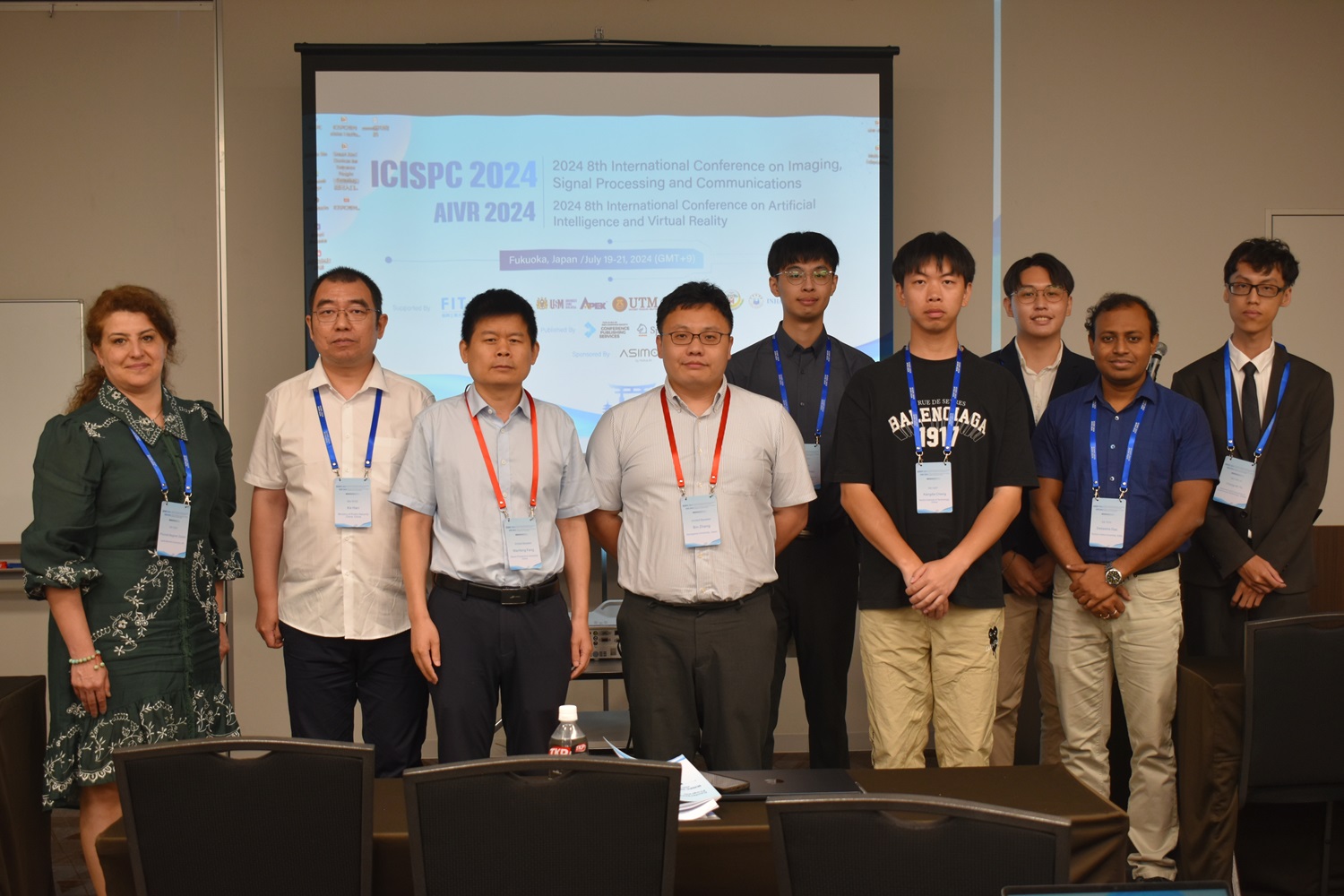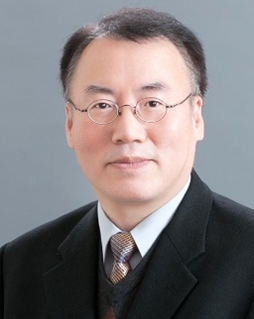ICISPC 2024
ICISPC 2024 conference
ICISPC 2024 has been successfully held in Fukuoka, Japan during July 19-21, 2024.
Thank you for your participation and support.





Best
presentations:
Session 1:
SA1035-A
Chih-Chang Yu
Chung Yuan Christian University, Taiwan
An exploratory study of using slope
feature and weakly supervised semantic
segmentation for landslide detection in
Taiwan
Session 2:
SA1011
Yuan-Kang Lee
National Taiwan University, Taiwan
Efficient Color Image Denoising using
DWT-based Noise Estimation and Adaptive
Wiener Filter
Session 3:
SA2016-A
Anne Schwerk
IU International University, Germany;
Berlin Institute of Health, Berlin,
Germany
PHANTOMATRIX: Explainability Dimensions
of Affective Computing
Session 4:
SA2008
Adrien Verhulst
Sony Computer Science Laboratories,
Inc., Japan
Exploring the Influence of Immersion and
Social Characteristics on Social
Presence when Conversing with a
Conversational Agent
Session 5:
SA1016
Xun Zhang
Harbin Institute of Technology, China
A Measurement Pairing Method Based on
MAP Criterion for Dense Targets in
Dual-Sensor System
Session 6:
SA2035
In Kyu Park
Inha University, South Korea
Efficient 3D Human Body Reconstruction
from Monocular Video with Depth-Guided
Learning
Session 7:
SA2047
Chung Kwan LO
The Education University of Hong Kong,
Hong Kong, China
An Exploratory Study of Using AI Tools
to Analyse Classroom Discourse Data
SA2107
Mesut Alptekin
Paderborn University, Germany
Quantitative and Qualitative Literature
Review of Augmented Reality in Teaching
and in Technical Laboratories since 2010
Session 8:
SA2029
Dante Silva and Yza Mae A. Cadid
Mapua University, Philippines
Neural Network-Particle Swarm
Optimization Approach for Prediction of
Deformation and Parallel Bending
Strength of Guadua angustifolia Kunth
Session 9:
SA1057
Wanwan Li
University of Tulsa, USA
PM4Bag: A Scriptable Parametric Modeling
Interface for Conceptual Bag Design
Using PM4VR
Session 10:
SA2011
Enes Yigitbas
Paderborn University, Germany
Effects of Human Avatar Representation
in Virtual Reality on Inter-Brain
Connections
SA2077
Hanin Hamed Hilal Al Naamani
University of Stirling, Sultanate of
Oman
VR Game Development: Team-building
Exercises Gamified
Speakers of ICISPC2024

Prof. Shahram Latifi
IEEE Fellow
University of Nevada,
USA
Biography: Shahram Latifi, received the Master of Science and the PhD degrees both in Electrical and Computer Engineering from Louisiana State University, Baton Rouge, in 1986 and 1989, respectively. He is currently a Professor of Electrical Engineering at the University of Nevada, Las Vegas. Dr. Latifi is the co-director of the Center for Information Technology and Algorithms (CITA) at UNLV. He has designed and taught undergraduate and graduate courses in the broad spectrum of Computer Science and Engineering in the past four decades. He has given keynotes and seminars on machine learning/AI and IT-related topics all over the world. He has authored over 300 technical articles in the areas of networking, AI/ML, cybersecurity, image processing, biometrics, fault tolerant computing, parallel processing, and data compression. His research has been funded by NSF, NASA, DOE, DoD, Boeing, and Lockheed. Dr. Latifi was an Associate Editor of the IEEE Transactions on Computers (1999-2006), an IEEE Distinguished Speaker (1997-2000), Co-founder and Chair of the IEEE Int'l Conf. on Information Technology (2000-2004) and founder and Chair of the International Conf. on Information Technology-New Generations (2005-Present) . Dr. Latifi is the recipient of several research awards, the most recent being the Barrick Distinguished Research Award (2021). Dr. Latifi was recognized to be among the top 2% researchers around the world in December 2020, according to Stanford top 2% list (publication data in Scopus, Mendeley). He is an IEEE Fellow (2002) and a Registered Professional Engineer in the State of Nevada.
Speech Title:
AI Advancements and Challenges:
Navigating the Future of Responsible AI
Over the past two decades, AI technology
has advanced at an astonishing pace.
Breakthroughs such as Deep Learning,
Generative Adversarial Networks,
Transfer Learning, and Large Language
Models have accelerated this progress,
enabling AI to revolutionize various
aspects of society. AI has significantly
enhanced the performance of systems in
fields like education, healthcare,
aerospace, manufacturing, security,
e-commerce, and art. However, alongside
these tremendous benefits come major
concerns about the potential threats AI
poses to humanity. How can we ensure our
training data is unbiased and
well-balanced? How can we guarantee that
AI systems respect individual privacy?
And most importantly, how can we ensure
these systems remain controllable and
act responsibly?
In this talk, I will provide a brief
overview of AI, Machine Learning (ML),
and Deep Learning (DL). While there are
significant challenges in achieving
general-purpose AI (as opposed to Narrow
AI), there are even greater issues that
must be addressed to ensure AI is safe,
fair, and secure. I will also discuss
recent efforts in the United States and
around the world to build responsible
AI.

Prof. Dr. Ho-Jin Choi
Korea Advanced Institute of Science & Technology (KAIST), South Korea
Biography: Prof. Dr. Ho-Jin Choi is a professor in the School of Computing at Korea Advanced Institute of Science and Technology (KAIST), Daejeon, Korea. He received a BS in computer engineering from Seoul National University (SNU), Korea, an MSc in computing software and systems design from Newcastle University, UK, and a PhD in artificial intelligence from Imperial College London, UK. During 1980’s he worked for DACOM Corp., Korea, in later 1990’s he joined with Korea Aerospace University, before he moved to KAIST in 2009. In early 2000’s, he visited Carnegie Mellon University (CMU), USA, and served as an adjunct faculty for the Master of Software Engineering (MSE) program operated jointly by CMU and KAIST for 10 years. In 2010’s he participated research in Systems Biomedical Informatics Research Center at the College of Medicine, SNU, worked with Samsung Electronics on big data intelligence solutions, and with UAE’s Khalifa University on intelligent multi-sensor healthcare surveillance. He also participated in a Korean national project called Exobrain for natural language question/answering. Since 2018, he has been the director of Smart Energy Artificial Intelligence Research Center, and since 2020 the director of Center for Artificial Intelligence Research, both at KAIST. His current research interests include natural language processing, machine learning, explainable AI, and smart energy.
Speech Title:
DialogCC for Creating High-Quality
Multi-Modal Dialogue Datasets
For sharing images in instant messaging,
active research has been going on
learning image-text multi-modal dialogue
models. Training a well-generalized
multi-modal dialogue model remains
challenging due to the low quality and
limited diversity of images per dialogue
in existing multi-modal dialogue
datasets. In this research, we propose
an automated pipeline to construct a
multi-modal dialogue dataset, ensuring
both dialogue quality and image
diversity without requiring any human
effort. In order to guarantee the
coherence between images and dialogue,
we prompt GPT-4 to infer potential
image-sharing moments, e.g., utterance,
speaker, rationale, and image
description. Furthermore, we leverage
CLIP similarity to maintain consistency
between aligned multiple images to the
utterance. Using this pipeline, we
introduce DialogCC, a high-quality and
diverse multi-modal dialogue dataset
that surpasses existing approaches in
terms of quality and diversity in human
evaluation. Our experiments highlight
multi-modal dialogue models trained
using our dataset, and their
generalization performance on unseen
dialogue datasets.

Assoc. Prof. Emi Yuda, Dr.Eng., PhD.
Tohoku University, Japan
Speech Title: Future Technology for
Non-invasively Estimating Biological
Status Using Bio-signal Processing for
Human
Abstract: In this talk, focus on
cutting-edge research in human
bio-signal processing and the analysis
of bio-medical big data. Especially, I
highlight advancements in signal
processing techniques for extracting
valuable information from bio-signals
heart rate variability (HRV) and body
acceleration. And discuss innovative
methods for enhancing bio-signal data
accuracy, human privacy, and security,
as well as their applications in
healthcare and human-computer
interaction.
Additionally, address challenges and
future directions in human bio-signal
research, emphasizing the importance of
interdisciplinary collaboration and
ethical considerations in handling
bio-medical big data.
Biography: Assoc. Prof. Emi Yuda is one of Japanese information engineer whose areas of expertise are bio-signal processing and bio-medical big data analysis. She is an associate professor at Tohoku University and has contributed to innovative research during her career. D. degrees in both informatics (Ph.D.) and engineering (Dr. Eng.). She applies ECG and acceleration signal analysis techniques from medical devices and wearable sensors to the fields of health science, disease screening, medication adherence and rehabilitation. Her research focuses on human dynamics, starting from pre-symptomatic disease state, disorder to recovered. Her work has helped develop new algorithms and improved the performance of human state estimation techniques. Research projects under her direction have attracted industrial interest and she has collaborated with many companies. She has actively presented her work at international conferences and in academic journals. She is also active as a reviewer of academic papers.